必修一 Unit 4 Earthquakes Period 1 Warming up and Reading)
- 格式:doc
- 大小:688.50 KB
- 文档页数:11
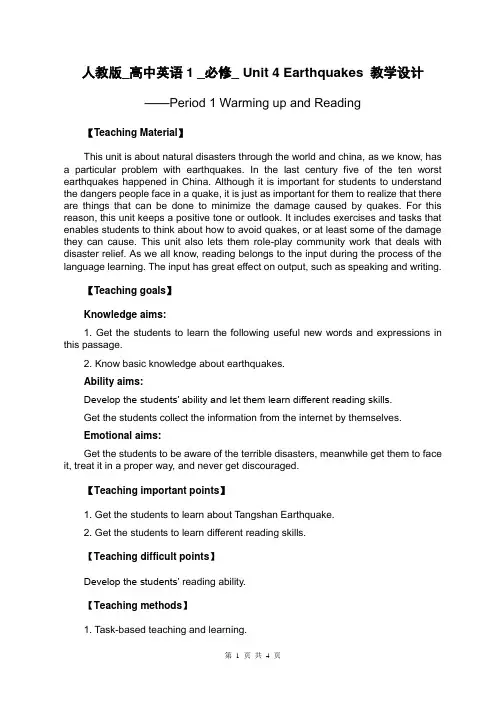
人教版_高中英语1 _必修_ Unit 4 Earthquakes 教学设计——Period 1 Warming up and Reading【Teaching Material】This unit is about natural disasters through the world and china, as we know, has a particular problem with earthquakes. In the last century five of the ten worst earthquakes happened in China. Although it is important for students to understand the dangers people face in a quake, it is just as important for them to realize that there are things that can be done to minimize the damage caused by quakes. For this reason, this unit keeps a positive tone or outlook. It includes exercises and tasks that enables students to think about how to avoid quakes, or at least some of the damage they can cause. This unit also lets them role-play community work that deals with disaster relief. As we all know, reading belongs to the input during the process of the language learning. The input has great effect on output, such as speaking and writing.【Teaching goals】Knowledge aims:1. Get the students to learn the following useful new words and expressions in this passage.2. Know basic knowledge about earthquakes.Ability aims:Develop the students’ ability and let them learn different reading skills.Get the students collect the information from the internet by themselves.Emotional aims:Get the students to be aware of the terrible disasters, meanwhile get them to face it, treat it in a proper way, and never get discouraged.【Teaching important points】1. Get the students to learn about Tangshan Earthquake.2. Get the students to learn different reading skills.【Teaching difficult points】Develop the students’ reading ability.【Teaching methods】1. Task-based teaching and learning.2. Fast reading, intensive reading3. Discussion.【Teaching aids:】CAI课件, A tape recorder【Teaching procedures】Step 1 Warming upWarming up by lookingShow Ss some pictures about natural disasters and ask them two questions.1. Can you tell some natural disasters?(volcano, fire, sandstorm, typhoon, hailstone, thunderstorm, flood, hurricane, earthquake)2. Have you ever experienced an earthquake? Can you describe how terrible an earthquake is?(The earth is shaking; all the buildings will fall down; many people will die; many children will become orphans.)Warming up by discussingNow, look at the pictures of Tangshan and San Francisco in warming up and describe what you see in the pictures.(Beautiful cities; broad roads; tall building; large population...)What will happen if there has been a big earthquake in these two cities?As we all know, earthquakes are disasters to everyone. But can we avoid or at least reduce the loss caused by earthquakes? Can we foretell earthquakes? Now let’s come to Pre-reading and decide what may happen before an earthquake comes.Step 2 Pre-readingImaging and sharingImagine there is an earthquake now. Your home begins to shake and you must leave it right away. You have time to take only one thing. What will you take? Is it money, water, fruits, mobile, phones, a torch light, or anything else? Why?Talking and sharingWhat are the signs of an earthquake? Talk about the pictures on Page 25.(e.g. Cows, pigs and dogs become too nervous too eat. The mice will run out of the fields looking for places to hide. The water in the wells will rise and fall. Walls of the wells in village will have deep cracks. There will be bright light in the sky….) Step 3 ReadingTell the students: Today, we are going to read a news report about the strongest earth-quake in China’s history, which happened in Tangshan, Hebei, in 1976.1. Fast readingAsk the students to read the passage quickly.1) Answer some questions.Ask the students to read the passage quickly and pay attention to the first sentence of each paragraph.2) Find out the topic sentences of each paragraph and get the general idea of the passage.3) Do some true or false exercises.Ask the students to decide whether the following statements are true or false. If it is false, try to correct it.2. Reading carefullyAsk the students to read the passage carefully to lacate particular information.1) Do the exercises in the part Comprehending on Page 27.2) Do some multiple choices.3. Language problemsWhile checking the answers with the whole class,deal with any language problems that the students can’t understand.4. Reading aloudPlay the tape of the passage for the students to listen and follow. Then play the tape of Paragraph 1 of the passage once more; this time the students listen and repeat.Step 4 GameWork in pairs. Supose you are a newspaper reporter, and other is a witness of the 1976 Tangshan Earthquake. Now the newspaper reporter is interviewing the witness.Step 5 DiscussionHow can we protect ourselves in the earthquake?Earthquake Survival TipsDriving --- pull over and stay in your car.In a building--- get near a strong wall / The corner of the room is the safest.Having classes--- listen to the teacher’s instruction, protect their heads and hide under the desks.On buses--- Grasp the handles to avoid being injured; lower the center of gravity; hide near the seats; get off after the earthquake passed.Step 6 HomeworkP review the reading “A Night the Earth didn’t Sleep” and learn new words of this unit.。
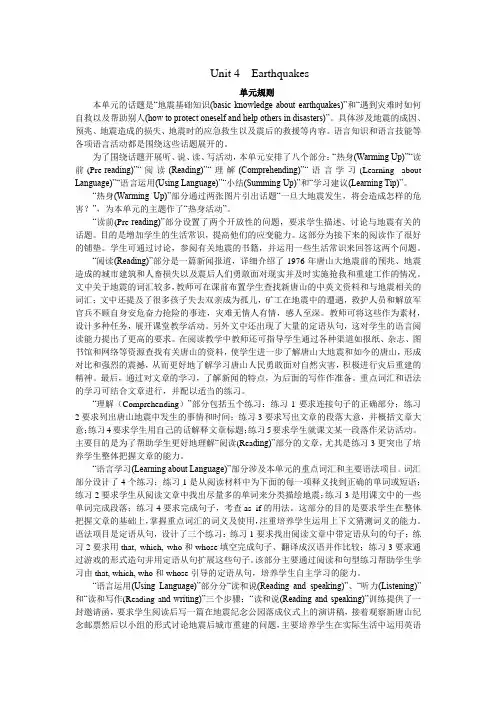
Unit 4Earthquakes单元规则本单元的话题是“地震基础知识(basic knowledge about earthquakes)”和“遇到灾难时如何自救以及帮助别人(how to protect oneself and help others in disasters)”。
具体涉及地震的成因、预兆、地震造成的损失、地震时的应急救生以及震后的救援等内容。
语言知识和语言技能等各项语言活动都是围绕这些话题展开的。
为了围绕话题开展听、说、读、写活动,本单元安排了八个部分:“热身(Warming Up)”“读前(Pre-reading)”“阅读(Reading)”“理解(Comprehending)”“语言学习(Learning about Language)”“语言运用(Using Language)”“小结(Summing Up)”和“学习建议(Learning Tip)”。
“热身(Warming Up)”部分通过两张图片引出话题“一旦大地震发生,将会造成怎样的危害?”,为本单元的主题作了“热身活动”。
“读前(Pre-reading)”部分设置了两个开放性的问题,要求学生描述、讨论与地震有关的话题。
目的是增加学生的生活常识,提高他们的应变能力。
这部分为接下来的阅读作了很好的铺垫。
学生可通过讨论,参阅有关地震的书籍,并运用一些生活常识来回答这两个问题。
“阅读(Reading)”部分是一篇新闻报道,详细介绍了1976年唐山大地震前的预兆、地震造成的城市建筑和人畜损失以及震后人们勇敢面对现实并及时实施抢救和重建工作的情况。
文中关于地震的词汇较多,教师可在课前布置学生查找新唐山的中英文资料和与地震相关的词汇;文中还提及了很多孩子失去双亲成为孤儿,矿工在地震中的遭遇,救护人员和解放军官兵不顾自身安危奋力抢险的事迹,灾难无情人有情,感人至深。
教师可将这些作为素材,设计多种任务,展开课堂教学活动。
另外文中还出现了大量的定语从句,这对学生的语言阅读能力提出了更高的要求。
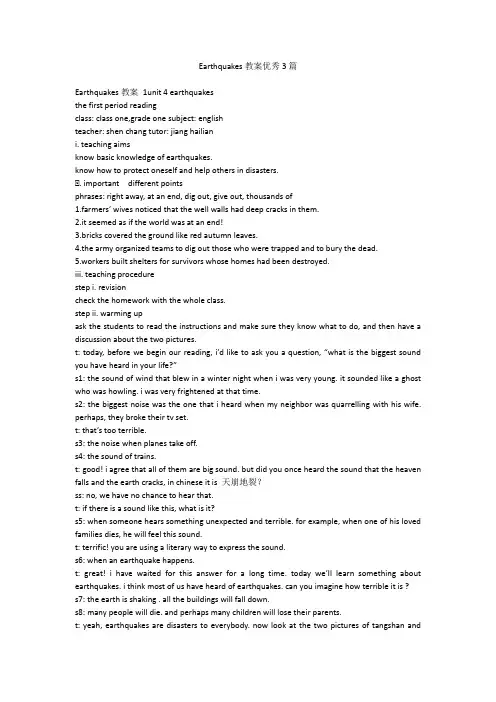
Earthquakes教案优秀3篇Earthquakes教案1unit 4 earthquakesthe first period readingclass: class one,grade one subject: englishteacher: shen chang tutor: jiang hailiani. teaching aimsknow basic knowledge of earthquakes.know how to protect oneself and help others in disasters.ⅱ. important different pointsphrases: right away, at an end, dig out, give out, thousands of1.farmers’ wives noticed that the well walls had deep cracks in them.2.it seemed as if the world was at an end!3.bricks covered the ground like red autumn leaves.4.the army organized teams to dig out those who were trapped and to bury the dead.5.workers built shelters for survivors whose homes had been destroyed.iii. teaching procedurestep i. revisioncheck the homework with the whole class.step ii. warming upask the students to read the instructions and make sure they know what to do, and then have a discussion about the two pictures.t: today, before we begin our reading, i’d like to ask you a question, “what is the biggest sound you have heard in your life?”s1: the sound of wind that blew in a winter night when i was very young. it sounded like a ghost who was howling. i was very frightened at that time.s2: the biggest noise was the one that i heard when my neighbor was quarrelling with his wife. perhaps, they broke their tv set.t: that’s too terrible.s3: the noise when planes take off.s4: the sound of trains.t: good! i agree that all of them are big sound. but did you once heard the sound that the heaven falls and the earth cracks, in chinese it is 天崩地裂?ss: no, we have no chance to hear that.t: if there is a sound like this, what is it?s5: when someone hears something unexpected and terrible. for example, when one of his loved families dies, he will feel this sound.t: terrific! you are using a literary way to express the sound.s6: when an earthquake happens.t: great! i have waited for this answer for a long time. today we’ll learn something about earthquakes. i think most of us have heard of earthquakes. can you imagine how terrible it is ?s7: the earth is shaking . all the buildings will fall down.s8: many people will die. and perhaps many children will lose their parents.t: yeah, earthquakes are disasters to everybody. now look at the two pictures of tangshan andsan francisco. can you describe what you see in the pictures?s1: tangshan is a beautiful city. it has beautiful gardens, broad roads and some tall buildings.s2: from the picture of san francisco, i can see that it is a very big city. there are many tall buildings thickly standing on the earth. i think the population of the city is very large.t: good! what will happen if there has been a big earthquake in these two cities? work in pairs and discuss it. then i’ll ask so me of you to show your opinion.step iii. pre-readingthere are two questions in this part. both are very interesting. the first one can more or less reveal the students’ values; while the second one can enlarge their imagination. no matter what their answers are, as long as they have given careful thoughts to the situations, their answers should be good.t: now, let’s look at the pictures. what are the predictions of an earthquake?s1: before an earthquake animals will become nervous. cows, pigs, horses and dogs will be upset. and people can see mice running about. if the earthquake happens during winter, people can even see snakes.t: terrific! where did you get this knowledge?s1: from geography. i like it.t: good. sit down please.s2: madam, i don’t know the meaning of the picture with two women.t: it doesn’t matter. you will know it soon after reading our text. ok. imagine there is an earthquake now, and your home is shaking, at this moment you have no time to take any other things but one, what will it be?s3: i’ll take all my money. people can’t live without money.s4: i will take as much water as possible. because it is said that people can keep alive for nearly 7 days by drinking without any foods5: in that case, i’d rather take some apples, so that besides drinking, i can also eat.s6: i will carry my grandma. she is my most loved person in this world. she brought me up.t: what a dutiful child you are! i’m very glad to hear that. sit down please! it seems that all of you know what you should do during an earthquake. ok. let’s read our text, and see what it tells us. step iv. readingin this part, teacher should ask the students to read the passage quickly for the first time to get the general idea of the passage. ask them to pay attention to the first sentence of each paragraph. this can help them finish exercise3 in comprehension. it is about the main idea of each paragraph. then ask them to read the text again carefully to obtain some details. before reading for the second time, show some questions on the screen, and let the students read the questions first. these questions can guide them to have a good understanding about the text. they can also make preparations for exs1-2, which are about details.skimmingt: at first i’d like to read the text quickly to get the general idea of the article. while reading, you should pay attention to the sentence of each paragraph.t: have you got the general idea of the text?ss: yes.t: what is it?s1: there is no quick answer to this question. are you suggesting us that the general idea is themixture of the first sentences of each paragraph?t: sure.s1:ok. that’s easy. the main idea of the passage is some signs of the earthquake, and what would happen during the quake.t: good, sit down please. in fact, while we are answering the questions, we have involved the sequence, the functional item for this unit. (teacher writes the word on the blackboard) do you understand the meaning of the word?ss: no.t: sequence means the order of the events. it can tell us which event happens first, and which happens later. do you know the sequence that is used in our text?s3: yes. at first, the text tells us something that happened before the quake, then it tells us the things that happened during the quake and at last it tells us the things that happened after the earthquake.t: quite right! now please look at the screen, these are the first sentences of each paragraph. read them and think if they are the main idea of the text. if necessary, you may make some changes to make more exact.teacher shows the screen and gives a little time to think it over.1.strange things were happening in the countryside in the northeast hebei.2.the disaster happened and caused a lot of loss.3. all hope was not lost.careful readingt: now, it’s time for us to read the text carefully. but before reading, you should read some questions first. these questions may help you get some information quickly and easily. now look at the screen, and read the questions.show on the screen1.what natural signs of a coming disaster were there?2.can you think of some reasons why these signs weren’t noticed?3.what events probably made the disaster worse?4.what situations probably made the disaster worse?5.how were the survivors held?step v. extensionshow the questions on the screen.1.from whose point of view are events described? how do you know?2.what is the mood of this passage? how is it created?3.why do you think the writer chooses to express his feelings about the quake rather than simply reporting what had happened?4.why is the title a night the earth didn’t sleep?5.what does the sentence “slowly, the city began to breathe again.” mean?answers:1.he uses third-person to describe the quake. his description is very objective. for example, the second sentence in the third paragraph. the writer says: “everywhere they looked nearly everything was destroyed.” the writer uses they instead of we.2.the mood is serious and a bit sad. it is created by giving details of how many people and animals were killed or injured, and how many buildings were destroyed.3.although the writer was not there, he felt sad for the people of tangshan. he knows that some personal feelings will make the reading more interesting.4.i think the reason is that, as usual, night is the time to sleep, and night should be safe and quiet. but that night everything changed. the writer uses a night the earth didn’t sleep as a title to show how terrible and how unusual the night was.5.here we can see that the writer compared the city to a person who suffered a lot in the disaster. he felt her pain, and he worried about her. so when he said that people came to help her, we can feel his feelings to the city. the city will not die, she has hope and she can recover from the pain. step vi comprehendinganswers to exx1-31.1. c2. e3.b4.d5.a2.1. the walls of the villages wells had cracks in them.2 .roads got huge cracks3. brick buildings were destroyed.4. the army helped the survivors.5. shelters were put up for those with no homes.3.1. strange things were happening in the countryside in northeast hebei..1.the disaster happened and caused a lot of loss.2.all hope was not lost.step vii homeworkEarthquakes教案2新课标高一必修1英语教案unit 4 earthquakes (简案)teaching plan for unit 4 earthquakesteaching aims and demands:1. topic:basic knowledge of earthquakes; how to protect oneself and help the others in disasters2. useful words and expressions:shake, well (n.), rise, smelly, pond, pipe, burst, canal, steam, dirt, ruin, injure, destroy, brick, dam, useless, steel, shock, quake, rescue, electricity, disaster, army, organize, bury, coal, shelter, fresh, percent, speech, judge, honour, prepare;right away, (be) at an end, dig out, bring in, a (great )number of3. functions:talking about past experiences:i will never forget the day when the earthquake took place. the time was 5:15 in the afternoon and i was driving along the road.sequence4. grammar:the attributive clause (i)由that, which, who, whose引导的定语从句the number of people who were killed or injured reached more than 400,000.it was heard in beijing which is one hundred kilometers away.workers built shelters for survivors whose homes had been destroyed.teaching procedures:period 1.step 1. warming upss discuss and answer some questions:1. which of the following may cause people the greatest damage?a. earthquakeb. typhoonc. floodd. drought2. imagine your home begins to shake and you must leave it right away. you have time to take only one thing. what will you take? why?step 2. pre-readingss discuss and answer:1. do you know what would happen before an earthquake?2. what can we do to keep ourselves safe from an earthquake?3. do you know anything about tangshan earthquake in 1976?step 3. reading1. skimming and find the answers to the following questions:a. what happened?b. when and where did it happen?2. ss read again and fill in the following form:time what happenedbefore the earthquake wells:animals:lights and sound:water pipes:while the earthquake houses, roads and canals:hard hills of rock:the large city:the people:after the earthquake hospitals, factories and buildings:the ground:dams:railway tracks:animals:wells:3. ss read the whole passage again and get the main ideas of each part:part 1. the natural signs of a coming earthquakepart 2. the damage of the city after the earthquakepart 3. the help to the survivorsstep 4. comprehendingss finish ex 1 and 2 on page 27.step 5. assignment1. surf the internet and get more information about the earthquake.2. retell the text.period 2.step 1. warming up1. ss share more information about the earthquake.2. ask some ss to retell the text by using their own words.step 2. language points1. lie –lay-lain (v.) : to be, remain or be kept in a certain state 处于某种状态the village lay in ruins after the war.these machines have lain idle since the factory closed.2. in ruins: severely damaged or destroyed 毁坏an earthquake left the whole town in ruins.his career is in ruins.3. number (n.): a quantity of people or things 数目;数量the number of people applying has increased this year.we were fifteen in number.a number of: a lot ofi have a number of letters to write.a large number of people have applied.4. injure (v.): to hurt oneself/sb./ sth. physically 受伤he fell off the bicycle and injured his arm.5. reach (v.): to achieve or obtain sth. 达成;达到;获得you’ll understand it when you reach my age.at last we reached a decision.6. rescue (n.): an act of rescuing or being rescued 搭救;解救a rescue team is trying to reach the trapped mines.rescue (v.): to save or set free from harm, in danger, or loss 解救;救出the rescued the man from drowning.7. trap(v.): in a place from which one wants to escape but cannot 困住;陷于绝境they were trapped in the burning hotel.8. all …not… = not all…: some but not all 一些;但不是全部not all the girls left.=only some of them left early.not all the children are noisy.=some of the children are not noisy.全部否定应用:none of…none of us were allowed to go there.none of these reports is very helpful.step 3. learning about language1. ss finish ex 1,2 and 3 on page 27 and 28.2. teacher checks the answer and give the ss some help if they have some difficulty.step 4. assignment1. finish wb.ex.1 on page 63.2. ss try to remember the useful words and expressions by hearts.period 3step 1. warming upss read the passage again and try to find the sentences with attributive clauses.e.g. workers built shelters for survivors whose homes had been destroyed.step 2. attributive clause1. give ss more sentences and let the ss to find the structures of the attributive clause.2. ss do some exercises about how to use that, which, who or whose.3. ss finish ex 2 on page 28.some materials about attributive clause:关系代词引导的定语从句关系代词所代替的先行词是人或物的名词或代词,并在句中充当主语、宾语、定语等成分。
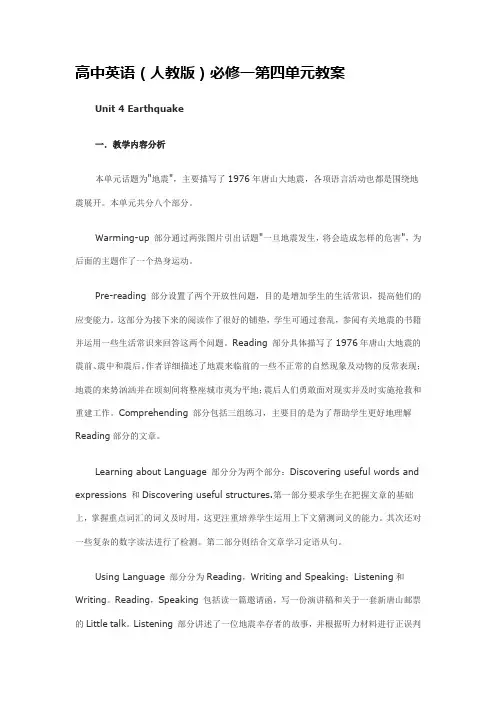
高中英语(人教版)必修一第四单元教案Unit 4 Earthquake一.教学内容分析本单元话题为"地震",主要描写了1976年唐山大地震,各项语言活动也都是围绕地震展开。
本单元共分八个部分。
Warming-up 部分通过两张图片引出话题"一旦地震发生,将会造成怎样的危害",为后面的主题作了一个热身运动。
Pre-reading 部分设置了两个开放性问题,目的是增加学生的生活常识,提高他们的应变能力。
这部分为接下来的阅读作了很好的铺垫,学生可通过套乱,参阅有关地震的书籍并运用一些生活常识来回答这两个问题。
Reading 部分具体描写了1976年唐山大地震的震前、震中和震后。
作者详细描述了地震来临前的一些不正常的自然现象及动物的反常表现;地震的来势汹汹并在顷刻间将整座城市夷为平地;震后人们勇敢面对现实并及时实施抢救和重建工作。
Comprehending 部分包括三组练习,主要目的是为了帮助学生更好地理解Reading部分的文章。
Learning about Language 部分分为两个部分:Discovering useful words and expressions 和Discovering useful structures.第一部分要求学生在把握文章的基础上,掌握重点词汇的词义及时用,这更注重培养学生运用上下文猜测词义的能力。
其次还对一些复杂的数字读法进行了检测。
第二部分则结合文章学习定语从句。
Using Language 部分分为Reading,Writing and Speaking;Listening和Writing。
Reading,Speaking 包括读一篇邀请函,写一份演讲稿和关于一套新唐山邮票的Little talk。
Listening 部分讲述了一位地震幸存者的故事,并根据听力材料进行正误判断和回答问题,旨在培养学生获取细节的能力,并通过听来模仿标准的语音和语调。
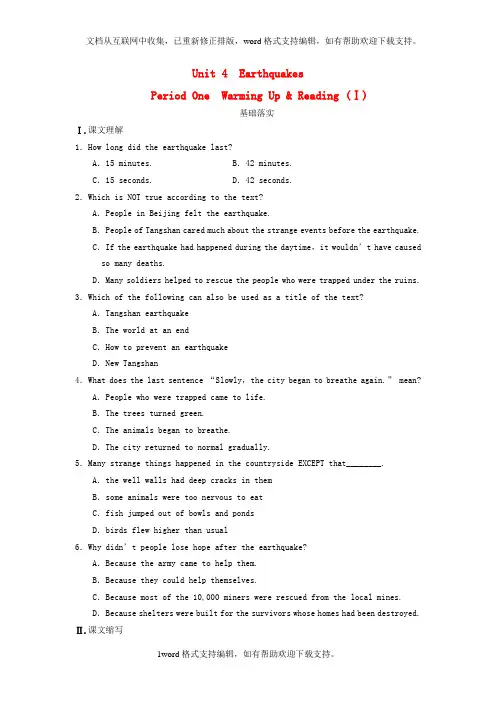
Unit 4 EarthquakesPeriod One Warming Up & Reading (Ⅰ)基础落实Ⅰ.课文理解1.How long did the earthquake last?A.15 minutes. B.42 minutes.C.15 seconds. D.42 seconds.2.Which is NOT true according to the text?A.People in Beijing felt the earthquake.B.People of Tangshan cared much about the strange events before the earthquake.C.If the earthquake had happened during the daytime,it wouldn’t have caused so many deaths.D.Many soldiers helped to rescue the people who were trapped under the ruins. 3.Which of the following can also be used as a title of the text?A.Tangshan earthquakeB.The world at an endC.How to prevent an earthquakeD.New Tangshan4.What does the last sentence “Slowly,the city began to breathe again.” mean?A.People who were trapped came to life.B.The trees turned green.C.The animals began to breathe.D.The city returned to normal gradually.5.Many strange things happened in the countryside EXCEPT that________.A.the well walls had deep cracks in themB.some animals were too nervous to eatC.fish jumped out of bowls and pondsD.birds flew higher than usual6.Why didn’t people lose hope after the earthquake?A.Because the army came to help them.B.Because they could help themselves.C.Because most of the 10,000 miners were rescued from the local mines.D.Because shelters were built for the survivors whose homes had been destroyed. Ⅱ.课文缩写Several days before July 28,1976,many 1.________ things happened in Tangshan.They were signs for an 2.________.But people 3.________ lived there didn’t thi nk much of that.At 3∶42 am that day,the earth began to shake,which 4.________ almost all the city in fifteen terrible seconds.Many people,including workers and doctors,came to 5.________ those who were 6.________ under the ter that afternoon,another big earthquake hit the city.More people were killed or 7.________ and more buildings 8.________ down.Very soon the army sent a lot of soldiers to help,and teams were 9.________ to dig out the trapped and to 10.________ the dead.By and by things improved and the city began to breathe again.Ⅲ.用适当的介、副词填空1.________ three days the water ________ the village wells rose and fell,rose and fell.2.A smelly gas came ________ of the cracks.3.______ about 3∶00 am ______ July 28,1976,some people saw bright lights ______ the sky.4.It was felt in Beijing,which is more than two hundred kilometres ________. 5.No wind,however,could blow them ________.6.Soon after the quakes,the army sent 150,000 soldiers ___ Tangshan to help the rescue workers.7.______ the north of the city,most of the 10,000 miners were rescued ____ the coal mines there.8.Workers built shelters ________ survivors whose homes had been destroyed. Ⅳ.用课文中的词语替换划线部分1.I told him immediately what I thought of him.________________2.It sounds as_though you had a good time.________________3.I went into the old house and found Grandad’s medals.________________4.A_great_many people are fond of what they are doing.________________5.She suddenly_began_to_cry when she saw her lost son.________________6.In 15 seconds,a large city was_completely_destroyed.________________Ⅴ.句型转换1.All of them are not right.________ ________ of them are right.2.It’s eight o’clock already and now we must be off at once.It’s eight o’clock already and now we must be off ________ ________.3.It seems that Bob knows everything,but in fact,he is stupid.It seems ________ ________ Bob knew everything,but in fact,he is stupid. 4.I bought a dictionary yesterday and it cost me 80 yuan.I bought a dictionary yesterday, ________ cost me 80 yuan.5.I happened to meet an old friend of mine in the street last week.________ ________ ________ I met an old friend of mine in the street last week.能力提升阅读理解When an earthquake hit a small town,many houses fell down.After the earthquake,all the newspapers reported many stories about some of the families who were in trouble.One Sunday,when I was reading a newspaper,a special picture touched me.It gave the clothing sizes of each family member.I thought that this would be a good chance to teach my children to help those who were less lucky than themselves.I said to my sevenyearold twins,Brad and Brett,and threeyearold Meghan,“We have so much,and these poor people now have nothing.We’ll share what we have with them.”I filled a box with foods and clothes.While I was doing this,I encouraged the boys to choose their toys and donate some of their less favourite things.Meghan watched quietly as the boys took out their old toys and games and put them together.Then she walked away.A few minutes later she came back with Lucy,her muchloved doll.She put the doll on top of the other toys.“Oh,dear,”I said.“You don’t have to give Lucy.You love her so much.”Meghan said,“Lucy makes me happy,Mommy.Maybe she’ll make another little girl happy, too.”I looked at Meghan f or a long moment.She taught me a lesson.It’s easy to give something that we don’t want any more,but hard to give what we cherish(珍爱),isn’t it?1.The writer has ________ children.A.one B.twoC.three D.four2.The underlined word “donate” in Paragraph 3 probably means “________”.A.捐赠B.丢掉C.展出D.放好3.Which of the following is TRUE?A.An earthquake happened in the writer’s hometown.B.The writer let Meghan give her muchloved doll.C.The writer decided to buy some clothes for those people in trouble.D.The writer thinks it is more difficult to give what we love a lot. 4.What’s the best title of this passage?A.A Family Story B.The Spirit of GivingC.The Way of Helping Others D.A Sad Experience答案基础落实Ⅰ.1.C 2.B 3.A 4.D 5.D 6.AⅡ.1.strange 2.earthquake 3.who 4.destroyed 5.rescue 6.trapped 7.injured 8.fell anized 10.buryⅢ.1.For;in 2.out 3.At;on;in 4.away 5.away 6.to 7.To;from 8.for Ⅳ.1.right away 2.as if 3.dug out 4.A great number of 5.burst into tears/burst out crying y in ruinsⅤ.1.Not;all 2.right;away 3.as;if 4.which 5.It;happened;that能力提升1.C 2.A 3.D 4.B。
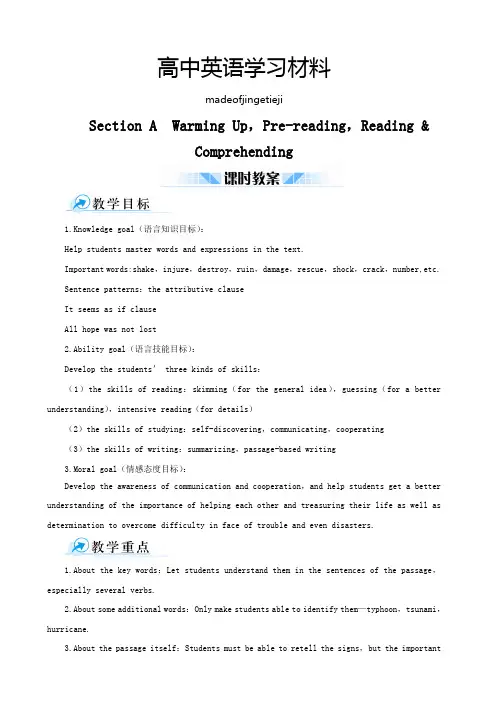
高中英语学习材料madeofjingetiejiSection A Warming Up,Pre-reading,Reading &Comprehending1.Knowledge goal(语言知识目标):Help students master words and expressions in the text.Important words:shake,injure,destroy,ruin,damage,rescue,shock,crack,number,etc.Sentence patterns:the attributive clauseIt seems as if clauseAll hope was not lost2.Ability goal(语言技能目标):Develop the students’ three kinds of skills:(1)the skills of reading:skimming(for the general idea),guessing(for a better understanding),intensive reading(for details)(2)the skills of studying:self-discovering,communicating,cooperating(3)the skills of writing:summarizing,passage-based writing3.Moral goal(情感态度目标):Develop the awareness of communication and cooperation,and help students get a better understanding of the importance of helping each other and treasuring their life as well as determination to overcome difficulty in face of trouble and even disasters.1.About the key words:Let students understand them in the sentences of the passage,especially several verbs.2.About some additional words:Only make students able to identify them—typhoon,tsunami,hurricane.3.About the passage itself:Students must be able to retell the signs,but the importantone is to describe the damage,of course which is the teaching important point for knowledge about the earthquakes and language ability.4.About the attributive clause:Just let students discover the sentence pattern through wh-questions.There is no need to explain in this period.5.Appreciating good sentences is an essential step.Never miss it.6.Developing students’ abilities of reading comprehension and summarizing is the core.Discussion and passage-based writing is to extend their ability.These are the teaching important and also difficult points for ability promotion and moral education.Step 1 Warming Up热身Ⅰ.Check the key words and expressions.见本部分课时学案Step 2 Lead in导入Teacher:How do you think of our world? Is it beautiful?Student:Yes,it is.Teacher:However,is our world always beautiful and safe?Student:No,it isn’t.Teacher:Why?Student:Sometimes it is destroyed by some natural disasters,so it is also dangerous.Teacher:What natural disasters have you ever seen?Student:I have seen...flood fire drought snowtyphoon tsunami volcanic eruption earthquake Teacher:There was a great natural disaster in our country many years ago,do you know what it is?Student:Yes,we do.It is called the Tangshan earthquake.Step 3 Pre-reading读前Teacher:More than 30 years ago,a terrible disaster suddenly happened,and the beautiful Tangshan was removed from the map.This is “Tangshan earthquake”.Before reading this passage in this unit,please consider the following questions.(1)Where does the city of Tangshan lie?(2)Do you know anything about the earthquake?(3)When did the earthquake happen?(4)What damages did it bring about?(5)How many people were injured or died in this accident?(6)What will you take with you if an earthquake happens?Teacher:Please read this news report about the Tangshan earthquake.Step 4 Reading1.Fast readingFast Reading:Scan the text and choose the best answers according to the text.(1)The first sentence in Paragraph 1 implies that .A.the survivors didn’t think too much of itB.the survivors were made to lose their senses by the sudden big earthquakeC.the survivors didn’t realize in such a brief instant that it was a terrible earthquakeD.the survivors didn’t think an earthquake could bring such great damage(2)How many signs are given that suggest an earthquake would happen in the first paragraph?A.Five.B.Nine.C.Twelve.D.Seven.(3)The second and third paragraphs are mainly about .A.he great loss the tearthquake brought to Tang-shanB.the number of people who were killed or injuredC.when and where an earthquake happenedD.the cause of the big earthquake in Tangshan(4)The title “A NIGHT THE EARTH DIDN’T SLEEP” means .A.the earth was awake all night longB.people on the earth couldn’t fall asleep that nightC.an earthquake happened that nightD.animals on the earth would not sleep that night(5)What is the mood of this passage?A.Sad.B.Serious.C.Serious and sad.D.Calm.Answers:(1)~(5) CBACC2.Listen to the tape and pay attention to the pronunciation,then do the T or F exercises.(1)Strange things were happening in the countryside of northwest Hebei.(F)(2)Farmers noticed the well walls had deep cracks,so they paid much attention to them.(F)(3)In the farmyards,the chickens and the pigs were too nervous to eat.(T)(4)The sound of planes could be heard outside the city when planes were in the sky.(F)(5)One third of the people died or were injured during the earthquake.(F)(6)Such a great number of people died because the earthquake happened while they were working.(F)(7)All the hospitals had been destroyed.(T)(8)Only supply of water and electricity was cut off.(F)(9)Almost everything in Tangshan was destroyed.(T)(10)Before the earthquake there wasn’t anything strange happening.(F)3.Careful readingRead the text carefully and try to master the structure of the text.Part EventsSigns before the earthquake (Paragraph 1)(1)Strange things were happening in Tangshan.For a few days,water in the wells (2)rose and fell;From the cracks of wells,(3)a smelly gas came out;Mice,chickens,pigs and even fish became (4)nervous;The water pipes cracked and burst.But people (5)thought little of them.Damage caused by earthquake (Paragraphs 2~3)The earthquake (6)destroyed the city and shocked the people.At 3:42 a.m.,everything began to (7)shake.It seemed that the world was at an (8)end.One-third of the nation (9)felt it.A huge (10)crack cut across the city.The city lay (11)in ruins.Two-thirds of the people (12)died or were injured.Rescue afterthe earthquake(Paragraph 4)Soldiers were sent to (13)dig out those who were trapped and to bury the dead.Workersbuilt (14)sheltersfor survivors whose homes had been (15)destroyed.4.ConsolidationWhat should we do to protect ourselves if an earthquake happens?(1)hold onto the furniture(2)hide in the corner of the house(3)hide under/by some strong furniture(4)drop onto the ground(5)keep away from the buildings(6)keep away from the power lines(7)keep away from the signs(8)put out the fire and turn off the gas(9)Use something hard to protect your head(10)never try to use the lift(11)don’t stay on the balcony(阳台)(12)don’t stay in the centre of the room(13)don’t jump out of tall buildings(14)don’t be upstairs or downstairsStep 5 Key language points见本部分课时学案部分Step 6 SummaryStep 7 Homework见本部分课时学案及答案部分。
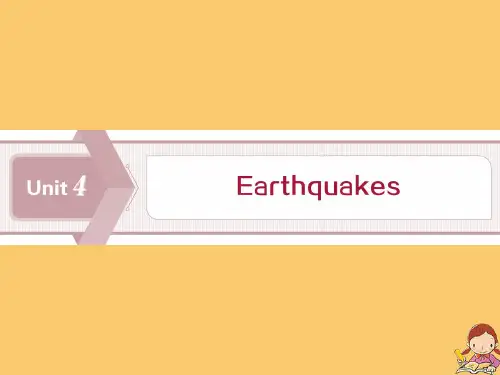
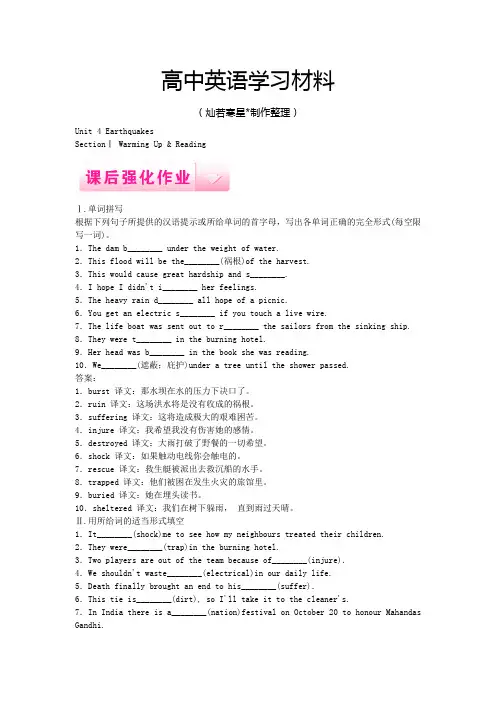
高中英语学习材料(灿若寒星*制作整理)Unit 4 EarthquakesSectionⅠ Warming Up & ReadingⅠ.单词拼写根据下列句子所提供的汉语提示或所给单词的首字母,写出各单词正确的完全形式(每空限写一词)。
1.The dam b________ under the weight of water.2.This flood will be the________(祸根)of the harvest.3.This would cause great hardship and s________.4.I hope I didn't i________ her feelings.5.The heavy rain d________ all hope of a picnic.6.You get an electric s________ if you touch a live wire.7.The life boat was sent out to r________ the sailors from the sinking ship. 8.They were t________ in the burning hotel.9.Her head was b________ in the book she was reading.10.We________(遮蔽;庇护)under a tree until the shower passed.答案:1.burst 译文:那水坝在水的压力下决口了。
2.ruin 译文:这场洪水将是没有收成的祸根。
3.suffering 译文:这将造成极大的艰难困苦。
4.injure 译文:我希望我没有伤害她的感情。
5.destroyed 译文:大雨打破了野餐的一切希望。
6.shock 译文:如果触动电线你会触电的。
7.rescue 译文:救生艇被派出去救沉船的水手。
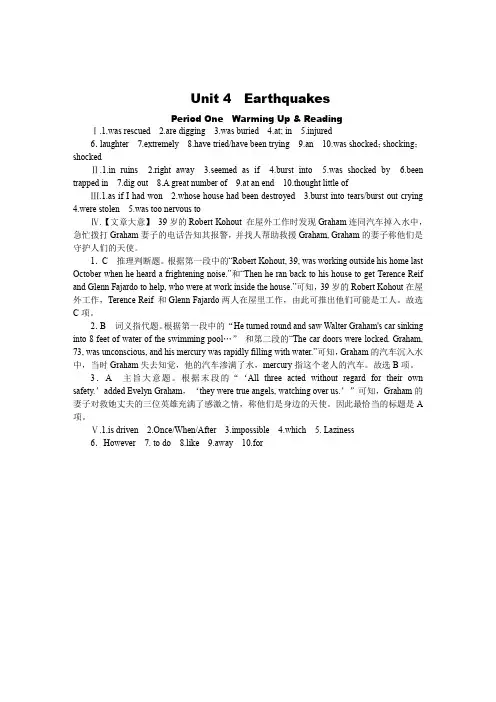
Unit 4EarthquakesPeriod One Warming Up & ReadingⅠ.1.was rescued 2.are digging 3.was buried 4.at; in 5.injured6.laughter7.extremely8.have tried/have been trying9.an10.was shocked;shocking;shockedⅡ.1.in ruins 2.right away 3.seemed as if 4.burst into 5.was shocked by 6.been trapped in7.dig out8.A great number of9.at an end10.thought little ofⅢ.1.as if I had won 2.whose house had been destroyed 3.burst into tears/burst out crying 4.were stolen 5.was too nervous toⅣ.【文章大意】39岁的Robert Kohout 在屋外工作时发现Graham连同汽车掉入水中,急忙拨打Graham妻子的电话告知其报警,并找人帮助救援Graham, Graham的妻子称他们是守护人们的天使。
1.C推理判断题。
根据第一段中的“Robert Kohout, 39, was working outside his home last October when he heard a frighte ning noise.”和“Then he ran back to his house to get Terence Reif and Glenn Fajardo to help, who were at work inside the house.”可知,39岁的Robert Kohout在屋外工作,Terence Reif 和Glenn Fajardo两人在屋里工作,由此可推出他们可能是工人。
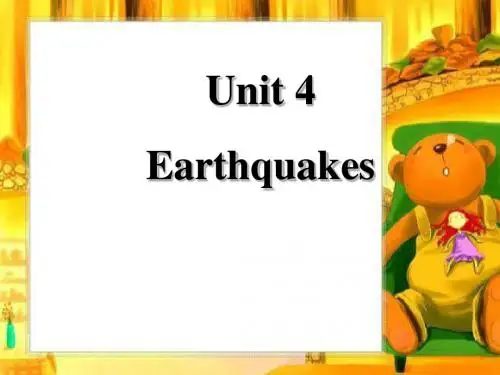
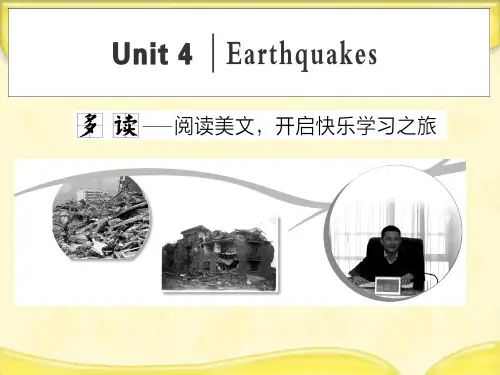
Unit 4Earthquakes单元规则本单元的话题是“地震基础知识(basic knowledge about earthquakes)”和“遇到灾难时如何自救以及帮助别人(how to protect oneself and help others in disasters)”。
具体涉及地震的成因、预兆、地震造成的损失、地震时的应急救生以及震后的救援等内容。
语言知识和语言技能等各项语言活动都是围绕这些话题展开的。
为了围绕话题开展听、说、读、写活动,本单元安排了八个部分:“热身(Warming Up)”“读前(Pre-reading)”“阅读(Reading)”“理解(Comprehending)”“语言学习(Learning about Language)”“语言运用(Using Language)”“小结(Summing Up)”和“学习建议(Learning Tip)”。
“热身(Warming Up)”部分通过两张图片引出话题“一旦大地震发生,将会造成怎样的危害?”,为本单元的主题作了“热身活动”。
“读前(Pre-reading)”部分设置了两个开放性的问题,要求学生描述、讨论与地震有关的话题。
目的是增加学生的生活常识,提高他们的应变能力。
这部分为接下来的阅读作了很好的铺垫。
学生可通过讨论,参阅有关地震的书籍,并运用一些生活常识来回答这两个问题。
“阅读(Reading)”部分是一篇新闻报道,详细介绍了1976年唐山大地震前的预兆、地震造成的城市建筑和人畜损失以及震后人们勇敢面对现实并及时实施抢救和重建工作的情况。
文中关于地震的词汇较多,教师可在课前布置学生查找新唐山的中英文资料和与地震相关的词汇;文中还提及了很多孩子失去双亲成为孤儿,矿工在地震中的遭遇,救护人员和解放军官兵不顾自身安危奋力抢险的事迹,灾难无情人有情,感人至深。
教师可将这些作为素材,设计多种任务,展开课堂教学活动。
另外文中还出现了大量的定语从句,这对学生的语言阅读能力提出了更高的要求。
在阅读教学中教师还可指导学生通过各种渠道如报纸、杂志、图书馆和网络等资源查找有关唐山的资料,使学生进一步了解唐山大地震和如今的唐山,形成对比和强烈的震撼,从而更好地了解学习唐山人民勇敢面对自然灾害,积极进行灾后重建的精神。
最后,通过对文章的学习,了解新闻的特点,为后面的写作作准备。
重点词汇和语法的学习可结合文章进行,并配以适当的练习。
“理解(Comprehending)”部分包括五个练习:练习1要求连接句子的正确部分;练习2要求列出唐山地震中发生的事情和时间;练习3要求写出文章的段落大意,并概括文章大意;练习4要求学生用自己的话解释文章标题;练习5要求学生就课文某一段落作采访活动。
主要目的是为了帮助学生更好地理解“阅读(Reading)”部分的文章,尤其是练习3更突出了培养学生整体把握文章的能力。
“语言学习(Learning about Language)”部分涉及本单元的重点词汇和主要语法项目。
词汇部分设计了4个练习:练习1是从阅读材料中为下面的每一项释义找到正确的单词或短语;练习2要求学生从阅读文章中找出尽量多的单词来分类描绘地震;练习3是用课文中的一些单词完成段落;练习4要求完成句子,考查as if的用法。
这部分的目的是要求学生在整体把握文章的基础上,掌握重点词汇的词义及使用,注重培养学生运用上下文猜测词义的能力。
语法项目是定语从句,设计了三个练习:练习1要求找出阅读文章中带定语从句的句子;练习2要求用that, which, who和whose填空完成句子、翻译成汉语并作比较;练习3要求通过游戏的形式造句并用定语从句扩展这些句子。
该部分主要通过阅读和句型练习帮助学生学习由that, which, who和whose引导的定语从句,培养学生自主学习的能力。
“语言运用(Using Language)”部分分“读和说(Reading and speaking)”、“听力(Listening)”和“读和写作(Reading and writing)”三个步骤:“读和说(Reading and speaking)”训练提供了一封邀请函,要求学生阅读后写一篇在地震纪念公园落成仪式上的演讲稿,接着观察新唐山纪念邮票然后以小组的形式讨论地震后城市重建的问题,主要培养学生在实际生活中运用英语的能力。
在随后的“听力”(Listening)部分里,一位美国人以第一人称讲述了他在1906年旧金山大地震中的可怕经历,要求学生根据听力材料进行正误判断和回答问题,旨在培养学生学会获取听力材料中的细节要点的能力,并通过听来模仿标准的语音和语调,同时让学生了解人们在自然灾害中的经历和感受。
“读和写(Reading and writing)”部分要求学生先阅读一篇新闻故事,然后为报纸写一篇新闻报道,描写家乡的一件不同寻常的事件,旨在培养学生按照规范的步骤进行写作,如选择适当的标题、组织语言、清晰地表达等,学会拟定写作提纲。
“小结(Summing Up)”部分帮助学生整理、巩固本单元所学到的知识,其中包括学到的关于地震的知识、有用的动词、名词、表达方式和新的语法项目。
一个单元学完后,鼓励学生进行一番归纳和总结是非常有用的,这样可以起到事半功倍的效果。
“学习建议(Learning Tip)”部分要求学生重视听的技能的训练,并就听英语方面给出了一些建议,建议学生多听广播或多看电视里的英语节目。
多听不仅能够提高听力水平,还能够帮助学生改善语音、语调,从而提高说的能力。
因此,听不仅是吸收信息的重要渠道,也是学好英语的重要手段之一。
教师可鼓励学生常听英文广播或电视节目,以扩大视野和增加英语的词汇量。
知识目标:本单元需要学习的重点单词为:shake well (n. )rise crack smelly pond pipe burst canal steam dirt ruin injure destroy brick dam useless steel shock quake rescue electricity disaster army organize bury coal mine shelter freshpercent speech judge honor prepare Europe本单元需要学习的重点词组为:right away at an end lie in ruins be trapped under sth.a (great)number of put up give out wake sb. up thousands of dig outprepare sb. for sth. think little of sb. /sth.本单元需要学习的重点句型为:1. But the one million people of the city, who thought little of these events, went to bed as usual that night. (the Attributive Clause)2. It seemed that the world was at an end! (It seems/seemed that. . . )3. Bricks covered the ground like red autumn leaves. (Simile)4. The army organized teams to dig out those who were trapped and to bury the dead. (those who. . . )5. Workers built shelters for survivors whose homes had been destroyed. (the Attributive Clause)6. Never before in history has a city been so completely destroyed. (Inversion)7. Man himself had to make ruins of some of the city’s best buildings so that they would not be a danger to those in the streets. (so that. . . )8. A list of buildings not destroyed was now only a few addresses. (the past participle used as attribute)9. Amazing as it may seem, Wednesday night was a quiet night. (predicative/adverbial+as. . . )10. Never in all San Francisco’s history were her people so kind as on that terrible night. (Inversion)本单元需要掌握的功能用语为:叙述过去的经历(Talking about past experiences)Strange things were happening in the countryside in Northeast Hebei. For three days the water. . . At about 3:00 am on July 28, 1976, people saw. . . At 3:42 am everything began to shake.本单元需要掌握的语法为:定语从句(I )(由that, which, who, whose引导的定语从句)A huge crack that was eight kilometers long and thirty meters wide cut across houses, roads and canals.The number of people who were killed or injured reached more than 400 000.It was heard in Beijing, which is one hundred kilometers away.Workers built shelters for survivors whose homes had been destroyed.能力目标:1. 能运用所学语言知识描述地震前兆、危害及震后援救。